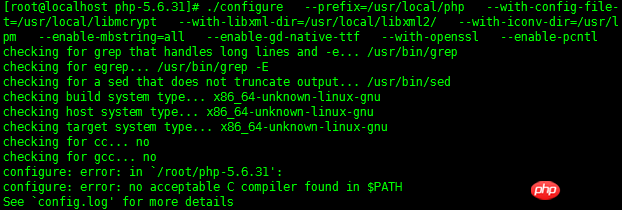 Backend Development
Backend Development
 PHP Tutorial
PHP Tutorial
 Graphic tutorial for compiling and installing php5.6 under centos7
Graphic tutorial for compiling and installing php5.6 under centos7
Graphic tutorial for compiling and installing php5.6 under centos7
1. Download the PHP installation package
wget http://php.net/distributions/php-5.6.31.tar.gz
By default, there is no connection between Nginx and PHP. Apache+PHP generates module files after compilation, while Nginx+PHP requires PHP to generate executable files, so fastcgi technology must be used to integrate Nginx and PHP. This only needs to be enabled during installation. FastCGI can be used. This time we installed PHP not only using FastCGI, but also using something like PHP-FPM. To put it bluntly, PHP-FPM is a manager for managing FastCGI. It exists as a plug-in for PHP. If you want to use it when installing PHP PHP-FPM needs to install PHP-FPM into PHP in the form of a patch, and PHP must be consistent with the PHP-FPM version. This is a must, remember!
2. Unzip and install
tar -zxvf php-5.6.31.tar.gz
cd php-5.6.3
./configure
--prefix=/usr/local/php
--with-config-file-path=/usr/local/php/etc
--with-png-dir=/usr/local/libpng
--with-jpeg-dir=/usr/local/jpeg
--with-freetype-dir=/usr/local/freetype
--with-zlib-dir=/usr/local/zlib
--with-mcrypt=/usr/local/libmcrypt
--with-libxml-dir=/usr/local/libxml2/
--with-iconv-dir=/usr/local/libiconv
--enable-libxml
--enable-xml
--enable-bcmath
--enable-shmop
--enable-sysvsem
--enable-inline-optimization
--enable-opcache
--enable-mbregex
--enable-fpm
--enable-mbstring=all
--enable-gd-native-ttf
--with-openssl
--enable-pcntl
--enable-sockets
--with-xmlrpc
--enable-zip
--enable-soap
--without-pear
--with-gettext
--enable-session
--with-curl
--enable-ctype
--enable-shared
--with-gdThe following error was reported during the installation process:

It turns out that the plug-in gcc is not installed.
Continue installation:
yum install gcc
After the plug-in is installed, we continue to install PHP

Finally the following error is reported:

The libxml2 plug-in is not installed. Because my system is a newly installed centos system, various dependency packages will be missing. Continue to install the libxml2 plug-in:
yum install libxml2
Tips:

libxml2 already exists, maybe libxml2-dev is not installed, we install libxml2-devel
yum install libxml2-devel
After installation, we continue to install PHP, and another prompt:

We
We install the openssl plug-in
yum install openssl openssl-devel
After the installation is complete, we continue to install PHP and report confirmation Plug-in liburl

Install liburl
yum -y install curl-devel
After installation, continue to install PHP. It reports that the GD library is not installed. Let’s continue to install the GD library

yum install libjpeg libpng freetype libjpeg-devel libpng-devel freetype-devel -y
Continue to install PHP reported missing plug-in libmcrypt

#使用wget可以通过以下路径下载 wget ftp://mcrypt.hellug.gr/pub/crypto/mcrypt/attic/libmcrypt/libmcrypt-2.5.7.tar.gz #解压 tar -zxvf libmcrypt-2.5.7.tar.gz #进入目录 cd libmcrypt-2.5.7 #编译(默认安装到/usr/local/lib/) ./configure --prefix=/usr/local/libmcrypt #执行安装 make && make install

make && make install
cp php.ini-development /usr/local/php/etc/php.ini
cp php-fpm.conf.default php-fpm.conf
/usr/local/php/sbin/php-fpm
cp php-5.6.31/sapi/fpm/init.d.php-fpm /etc/init.d/php-fpm
#启动 service php-fpm start #停止 service php-fpm stop #重启 service php-fpm reload
gcc, libxml2, openssl, curl, libmcrypt, but everyone’s environment is different, and there may be different missing plug-ins. You can install them one by one according to the prompts.
The above is the detailed content of Graphic tutorial for compiling and installing php5.6 under centos7. For more information, please follow other related articles on the PHP Chinese website!

Hot AI Tools

Undresser.AI Undress
AI-powered app for creating realistic nude photos

AI Clothes Remover
Online AI tool for removing clothes from photos.

Undress AI Tool
Undress images for free

Clothoff.io
AI clothes remover

AI Hentai Generator
Generate AI Hentai for free.

Hot Article

Hot Tools

Notepad++7.3.1
Easy-to-use and free code editor

SublimeText3 Chinese version
Chinese version, very easy to use

Zend Studio 13.0.1
Powerful PHP integrated development environment

Dreamweaver CS6
Visual web development tools

SublimeText3 Mac version
God-level code editing software (SublimeText3)

Hot Topics
 CakePHP Project Configuration
Sep 10, 2024 pm 05:25 PM
CakePHP Project Configuration
Sep 10, 2024 pm 05:25 PM
In this chapter, we will understand the Environment Variables, General Configuration, Database Configuration and Email Configuration in CakePHP.
 PHP 8.4 Installation and Upgrade guide for Ubuntu and Debian
Dec 24, 2024 pm 04:42 PM
PHP 8.4 Installation and Upgrade guide for Ubuntu and Debian
Dec 24, 2024 pm 04:42 PM
PHP 8.4 brings several new features, security improvements, and performance improvements with healthy amounts of feature deprecations and removals. This guide explains how to install PHP 8.4 or upgrade to PHP 8.4 on Ubuntu, Debian, or their derivati
 CakePHP Date and Time
Sep 10, 2024 pm 05:27 PM
CakePHP Date and Time
Sep 10, 2024 pm 05:27 PM
To work with date and time in cakephp4, we are going to make use of the available FrozenTime class.
 CakePHP File upload
Sep 10, 2024 pm 05:27 PM
CakePHP File upload
Sep 10, 2024 pm 05:27 PM
To work on file upload we are going to use the form helper. Here, is an example for file upload.
 CakePHP Routing
Sep 10, 2024 pm 05:25 PM
CakePHP Routing
Sep 10, 2024 pm 05:25 PM
In this chapter, we are going to learn the following topics related to routing ?
 Discuss CakePHP
Sep 10, 2024 pm 05:28 PM
Discuss CakePHP
Sep 10, 2024 pm 05:28 PM
CakePHP is an open-source framework for PHP. It is intended to make developing, deploying and maintaining applications much easier. CakePHP is based on a MVC-like architecture that is both powerful and easy to grasp. Models, Views, and Controllers gu
 CakePHP Creating Validators
Sep 10, 2024 pm 05:26 PM
CakePHP Creating Validators
Sep 10, 2024 pm 05:26 PM
Validator can be created by adding the following two lines in the controller.
 How To Set Up Visual Studio Code (VS Code) for PHP Development
Dec 20, 2024 am 11:31 AM
How To Set Up Visual Studio Code (VS Code) for PHP Development
Dec 20, 2024 am 11:31 AM
Visual Studio Code, also known as VS Code, is a free source code editor — or integrated development environment (IDE) — available for all major operating systems. With a large collection of extensions for many programming languages, VS Code can be c





